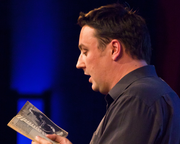The Unclaimed Girl
By Barry Hutchison
We have commissioned a new piece of writing from fifty leading authors on the theme of 'Elsewhere' - read on for Barry Hutchison's contribution.
Imelda Brown stood on the platform, wondering what the hell was going on. She had just stepped off a train, which was confusing, as she had no memory of stepping on one.
Behind her, other passengers disembarked. They milled around on the platform, eyeing each other suspiciously, all looking just as bewildered as Imelda felt. A bright blue, cloudless sky hung overhead. This was also causing Imelda concern. Last time she’d checked it had been snowing, and it had been cold, and it had been dark.
A man, grey hair and wrinkles, grabbed her by her coat sleeve. Instinctively, Imelda yanked her arm away, but the man barely seemed to notice.
‘W-where am I?’ he asked, his voice cracking. ‘Where is this?’
Imelda glanced around. A large, impressive building, all sandstone pillars and tall, arched windows, boxed them in on three sides.
There appeared to be just one platform – the one they were standing on. The word “ARRIVALS” was printed on a billboard hung above the tracks. She couldn’t see a sign for departures, and there was nothing to reveal the station’s name.
‘No idea,’ Imelda admitted.
‘I can’t find Dorothy,’ the man fretted. ‘I can’t find my Dotty. Have you seen her?’
Imelda shook her head. ‘No,’ she said. ‘Sorry.’
Wringing his hands, the man turned and stumbled through the crowd, calling out Dotty’s name.
For the first time, Imelda looked properly at her fellow passengers. There were a hundred or more of them, all looking lost. Most of those she could see appeared to be in their late sixties or older, but there were a few forty-somethings in the mix, too. No one her age, though. Not even close.
A few people were talking, but from their body language it was clear none of them was listening to what the others were saying. Some of the older ones were crying. Some of the younger ones too. Imelda shook her head. Crying never got anyone anywhere.
A loud musical note rang out, silencing the rising hysteria before it could fully build. Imelda looked in the direction of the sound. A uniformed man stood farther along the platform, blowing into a battered old trumpet.
The note lasted for several seconds. When it had finished, the man brought the instrument down sharply to his side and cast his gaze across the now silent occupants of the platform.
His uniform was a navy blue coat over a matching waistcoat and trousers. Brass buttons, polished to a brilliant sheen, stood out against the dark material. On his head was a cap with an official-looking badge sewn to the front of it. Imelda was too far away to read what the badge said, but she guessed it was something to do with the railway. He wasn’t police anyway. She could tell one of them a mile off.
The man noisily cleared his throat, patted down his thick moustache, and began to speak.
‘Ladies and gentlemen, I am the Station Master,’ he said in a voice that did nothing to set Imelda at ease. It was an officious, self-important voice. She’d heard plenty like it before, and hated every one. ‘In a calm, orderly fashion you will all follow me. Stay close together, no wandering off.’
‘What’s going on?’ called someone from the crowd. ‘Where are we?’
‘All in good time,’ replied the Station Master. He performed a stiff about-turn and began marching in the direction of a door marked “EXIT”. ‘Now come along,’ he ordered. ‘I can’t be standing around here all day.’
A low muttering spread through the crowd. Slowly, though, everyone began to follow the Station Master towards the door. Imelda hung back, waiting until most of the throng had passed through the exit before following.
She heard the first cry of shock just as she reached the door. She tried to retreat, but the people behind her kept pushing forward, carrying her on through.
‘Get off,’ she snapped. ‘Stop pushing.’
More yells and screams from up ahead drowned her out. She stumbled through the doorway, her eyes frantically scanning for another exit, for some way to escape whatever was happening to her fellow passengers.
It was only as she was shoved in amongst the shouts and the squeals that she realised they were cries of delight, not fear. Dozens – in fact hundreds – of people stood just beyond a row of polished chrome turnstiles. Men and women of every age and race huddled together, grinning and cheering excitedly as the passengers entered from the platform.
‘Mum?’ squawked a middle-aged woman on the other side of the turnstiles.
An old woman at Imelda’s side turned her head sharply at the sound of her daughter’s voice. ‘B-Becca?’ she gasped. Her hand flew to her mouth and tears sprang to her eyes. Imelda moved aside to let her pass, but the Station Master stepped into her path, hand raised.
‘Not yet,’ he said, stopping the woman in her tracks. He gave his moustache another pat and adjusted his hat before continuing. ‘This is Station Sixty-Two. Beyond the gates you will find people waiting for you. Some of them you may know, many of them you will not. Those you do not know will have signs. If you see your name on a sign, go to that person and they will take care of you until you are in a position to take care of yourself.’
The Station Master carried on talking, but Imelda had stopped listening. She was scanning the waiting crowd, searching for a face she recognised, but finding none.
About a quarter of those waiting clutched home-made signs. Silently, she read off the names. Ameena Ahmed. Maggie Cooper. Yan-Yan Chow. There were others, many others. But no Imelda Brown.
‘Right then,’ barked the Station Master, finally stepping aside. ‘On your way, the lot of you.’
Like crashing waves, large sections of the crowd surged forward. They called and gestured to those waiting for them, falling over one another as they fought their way through the turnstiles.
Imelda watched them. She watched the hugging, the kissing, the handshaking. She heard the chatter and the laughter and the tears. And she wished, for a moment, that she were part of it.
But she wasn’t. And that was that.
Less than twenty passengers remained on her side of the turnstiles. One by one they spotted their names. One by one they approached those holding ‘their’ sign. Polite smiles and introductions were exchanged. Questions were asked, and answers given, but Imelda was too far away to hear.
In dribs and drabs the passengers and their new-found companions filed away. Imelda stood her ground, watching them until there was no-one left but her.
‘OK,’ she muttered, although she wasn’t quite sure why. She blew out her cheeks and shook her head. ‘OK.’
‘Why are you still here?’ demanded the Station Master. Imelda jumped. She’d forgotten he was even there.
‘Um... Hi. I don’t know where—’
The man jabbed a thumb in the direction of a desk, way against the far wall. ‘Unclaimed Girls,’ he snapped.
Imelda blinked. ‘What?’
‘You deaf? Unclaimed Girls. Go,’ he said. ‘There,’ he said. ‘Now.’
Imelda felt her fists clench. The temptation to punch the Station Master right in his scowling face was great, but she knew that hitting someone in uniform was never a good idea. Not from the front, anyway.
Biting her lip, she pushed through the closest turnstile. The station building was as impressive inside as it was outside – a vast, cathedral-like construction with enormous pillars stretching all the way up to the high, domed ceiling. The thud of her boots on the polished floor echoed around the now-empty station as she made her way over to the desk. It was a flimsy, flat-packed bit of furniture, stained with coffee rings and blue biro – an obvious afterthought among the grandeur of the station.
A pudgy, red-haired woman slumped behind the desk, a cigarette hanging from her bottom lip. As Imelda approached, a blob of ash fell from the end of the woman’s cigarette and vanished into her impressive cleavage. She seemed neither to notice norcare.
‘Yes?’ the woman asked.
‘Hi,’ Imelda began. ‘Is this... Unclaimed Girls?’
The woman took the cigarette from her mouth, blew a smoke ring, then inhaled it back up through her nose. She tapped a small wooden sign on the desktop. ‘That’s what it says.’
Imelda’s eye twitched. ‘So it does.’ She watched the woman take another long draw of the cigarette. ‘Those things’ll kill you. You know that?’
The woman’s expression didn’t change. ‘Funny,’ she said, after a long pause. ‘Now, what do you want?’
Imelda leaned over the desk. ‘Answers,’ she said. ‘Like where I am. And how I got here.’ She picked up the “UNCLAIMED GIRLS” sign. ‘And what this means.’
A sheet of paper was slid across the desk towards her. Imelda glanced down at it. ‘What’s this?’
‘Registration document B7784,’ the woman said, stubbing out one cigarette and lighting another. ‘Fill it in.’
Imelda scanned the document. It was a questionnaire. Name. Date of birth. Marital status. The usual. The fourth question jumped out at her though. She had to read it three times before she was satisfied she’d read it correctly.
‘What does this one mean?’ she asked, tapping the page.
The woman didn’t look down. ‘Pretty self-explanatory, I’d have thought.’
‘Aye, but... Is it a joke?’
‘Do I look like I’m laughing?’
Imelda turned back to the paper. She read the question again. It was simple enough. Just three words. She read them once more, out loud this time.
‘Cause of Death?’
Across the desk, the woman gave a theatrical sigh. ‘Look,’ she said, ‘I’ll make it easy. How old are you?’
‘What?’ Imelda said, dragging her eyes away from the page. ‘Fifteen.’
‘Too young for Ratched’s, too old for Nessie’s,’ the woman muttered. ‘Teeth.’
Imelda frowned. ‘Teeth?’
‘Teeth. Show me.’ The woman chomped the air a few times to demonstrate.
Caught off guard, Imelda pulled a grimace, showing her teeth and gums.
‘Seen worse, but Hawthorne won’t take you.’
A commotion behind her made Imelda turn around. People were filing into the station. They hurried over to the turnstiles and stood there, waiting impatiently for the platform door to open.
‘I haven’t got time for this,’ the woman sighed. She pushed aside an overflowing ashtray, revealing a small intercom built into the desk top. There was a loud buzz as she pressed a button. ‘We’ll go with Windsome. You’re about the right age.’
‘Right age for what?’ Imelda asked.
‘Hello?’ said a woman’s voice over the intercom. ‘Miss Windsome speaking.’
‘Yeah, hello, Miss Windsome. It’s Jane at the desk. We’ve got one for you.’
‘Really? Thank you, Jane,’ trilled the voice. ‘I shall be right with you.’
Click. Jane released the intercom button and leaned back in her chair. ‘She’ll be right with you. Take a seat.’
‘Who’ll be right with me?’ Imelda demanded. ‘What’s going on?’
‘Take a seat,’ Jane repeated.
Imelda slammed her hands down on the desk. ‘If you don’t tell me what the hell’s going on, I swear I’m going to make you eat that cigarette.’
‘Hello, dear,’ called a voice from right behind her. Imelda turned and found herself face to face with a grey-haired woman in an enormous brute of a dress. It was shiny and satiny, all puffed out from the waist like a giant lampshade. A flowery bonnet completed the look.
‘Jesus,’ Imelda muttered, looking the woman up and down. ‘I didn’t realise it was fancy dress.’
‘I’m Miss Windsome,’ the woman said, ignoring the jibe. ‘Headmistress of Miss Windsome’s School for Unclaimed Girls. I suspect you have many questions.’
‘Aye,’ Imelda said. ‘Starting with where am I?’
‘Dead. I’m afraid you’re dead,’ Miss Windsome smiled apologetically. ‘Sorry.’
Imelda didn’t bother to argue. There was no reason to. Somehow, she knew the woman was telling the truth.
‘I’m... I’m...’
A bubble rose up in her stomach. It was in her throat before she knew it, threatening to emerge as a scream of panic, but she swallowed it back down and gave herself a shake. Panic was pointless, and she’d learned long ago that nobody came when she screamed.
It was over. Her life was over. She’d just have to accept that and move on.
‘Dead. Right.’ She jabbed a thumb in Jane’s direction. ‘I’m guessing by the look on her coupon that I’m not in Heaven.’
‘I heard that.’
Miss Windsome shook her head. ‘No, not Heaven, but not... not the other place, either. It turned out we were a bit off the mark on those fronts. There’s only here.’
‘The railway station?’
‘The City.’
Imelda looked to the station’s main doors. ‘A city?’
‘The City,’ Miss Windsome corrected. ‘The City of the Dead.’ She gave a polite cough. ‘How did you...? If you don’t mind me asking?’ She paused, composing herself. ‘What’s the last thing you remember?’
‘Cold,’ Imelda said, quietly. She remembered the frost biting at her fingers and toes, the icy kiss of the concrete step beneath her, the uncontrollable shakes as the snow came down and down and down, covering her like a shroud. ‘I... I was cold. Lying in the snow.’
‘You were lying in the snow? Outside? Why?’
‘There was nowhere else to go.’
‘Why on earth didn’t you go home?’
Imelda saw her breath cloud in front of her face, felt wetness trickle down her cheek. She moved quickly, wiping the tear with the back of her hand. But she didn’t move quickly enough.
‘Oh!’ said Miss Windsome, her voice cracking. ‘Oh, you poor dear.’
Imelda turned on her. ‘Don’t say that,’ she growled. ‘Don’t call me that!’
‘Oh, but you are,’ Miss Windsome insisted. ‘It’s terrible, you poor dear.’
‘Quit it. I’m not a poor dear. I’m not a poor anything, alright? When are you people going to get that through your thick skulls?’
Miss Windsome blinked. ‘You people?’
‘Do-gooders,’ Imelda snapped. ‘Busybodies. Social workers. Whatever. You’re all the same. It’s all “poor dear, must be so hungry” and “poor dear, must be so scared” and “poor dear, isn’t it terrible?”.Talking about me like I’m just a thing to be pitied.’
She took a deep breath, held it, then let it out. When she spoke again, some of the harshness had left her voice. ‘I don’t want pity.’
Miss Windsome nodded. ‘Very well,’ she said. ‘But outside this station, beyond those doors, walks everyone who has ever died. Victorians. Romans. Aztecs. Modern-agers, like you. Everyone.’
‘Everyone? That’d be hundreds of billions of people.’
‘Well,’ said Miss Windsome, smoothing the front of her dress, ‘I wouldn’t know about that. But I do know that at my school you would be kept safe from the many dangers out there on those streets.’
She stepped closer. ‘You would be fed. You would be educated. You would be given something to replace those awful clothes.’
Imelda looked down at what she was wearing. Her heavy boots and dark, dirty denim were a stark contrast to the headmistress’s outfit. ‘What’s wrong with my clothes?’
Behind her desk, Jane snorted out a laugh, then lit another cigarette.
‘There are other girls, too,’ Miss Windsome continued, ‘your age. Friends, perhaps.’
‘I can survive on my own,’ Imelda said.
The headmistress gestured around them. ‘Perhaps not the best choice of word, given the circumstances?’
Imelda didn’t answer. She could hear sounds now from outside. Car engines. Voices. City sounds.
Miss Windsome reached out and smiled warmly. Imelda looked at the offered hand and felt her own twitch in response. Her eyes met those of the headmistress. ‘I could really get that stuff?’ she asked. ‘That stuff you said?’
Miss Windsome nodded. ‘Food, clothes, education, companionship. It would all be yours.’ She gave a slight shrug of her shoulders. ‘I’ll be honest, you’re not what we’d usually look for in a Windsome Girl, but we could make an exception.’
Imelda’s hand went limp.
‘Why would you do that?’
‘Well... given the circumstances.’
‘What circumstances?’
‘You know,’ began Miss Windsome, ‘with you being...’
Imelda said the words for her, but the frosty edge had left her voice. ‘A poor dear. Right.’
‘I didn’t mean it like that.’
Imelda shrugged. ‘Yes, you did.’
She turned away from the headmistress and looked towards the main door. There was a city out there.
‘I’m dead,’ she said. ‘I’m really dead.’
Miss Windsome nodded. ‘Yes you are. We have counsellors to help you come to terms with that.’
‘Forget it,’ Imelda said. She looked through the windows at the brilliant blue sky. It looked nicer than snow, any day. Warmer, too. ‘I think I already have.’
A city. Not hers, maybe, but a city all the same. She took a step towards the door.
‘What are you doing?’ Miss Windsome gasped. ‘It’s dangerous out there. There are... there are... Vikings!’
Imelda paused. ‘Vikings? What, like actual proper Vikings?’
‘Yes! Real Vikings!’
‘Cool.’
Miss Windsome shook her head. ‘No! They’re dangerous. The whole city is dangerous. A girl couldn’t possibly cope on her own!’
Imelda smiled. Her first real smile in as far back as she could remember. ‘Come on,’ she said, ‘I’m dead. What’s the worst that can happen?’
Feeling more alive than she ever had, Imelda Brown ran across the station, past the waiting crowds, and hauled open the door. The warmth of the sun prickled her skin as she slipped into the hustle and bustle of the City of the Dead.
Still unclaimed.
Copyright © 2010, Barry Hutchison. All rights reserved.
Supported through the Scottish Government’s Edinburgh Festivals Expo Fund.
Look, Listen & Read
- 2026 Festival:
- 15-30 August
Latest News
 Major new partnership with Celtic Connections
Major new partnership with Celtic Connections







